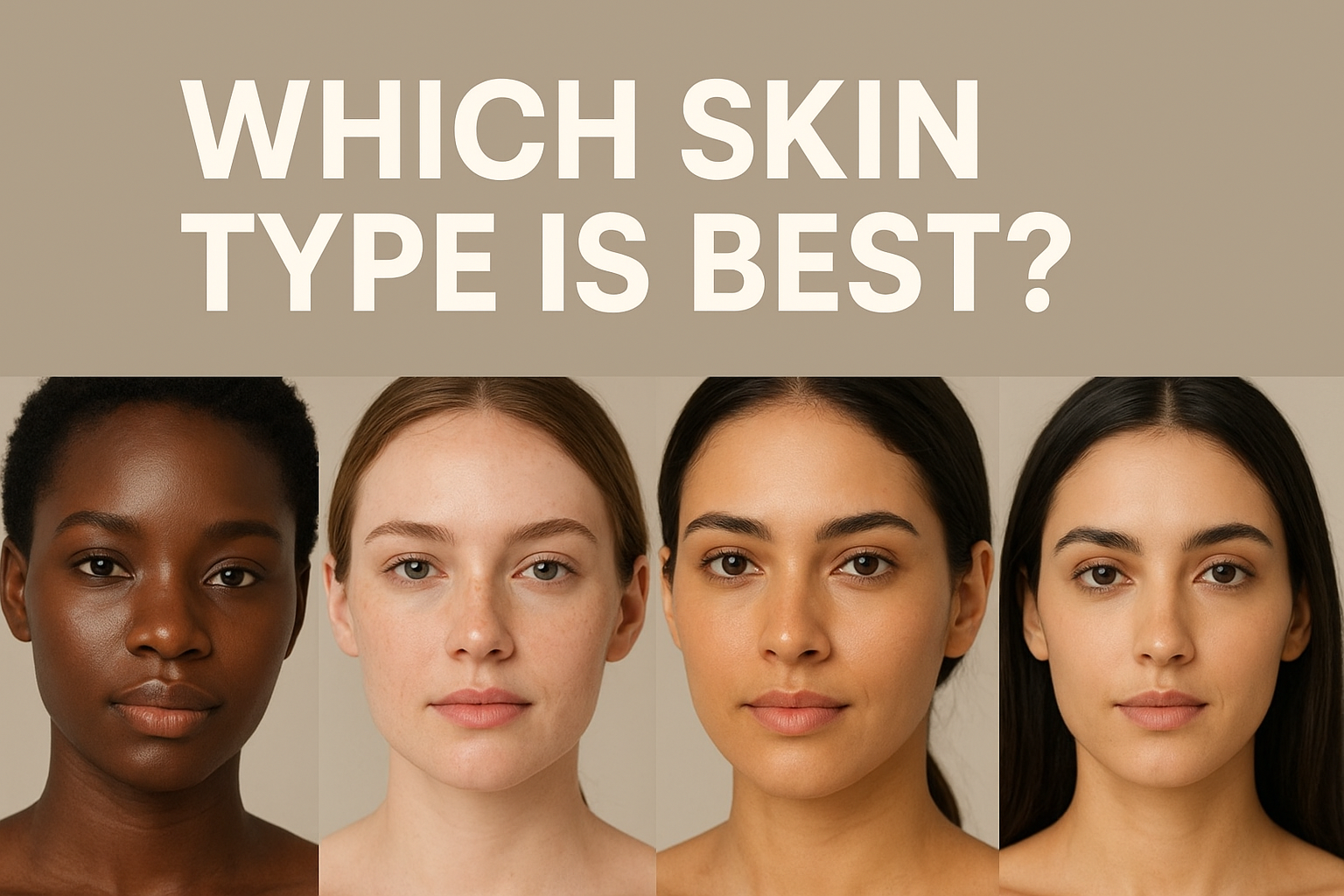Have you ever wondered which skin type is best or felt envious of someone’s seemingly perfect complexion? Maybe you’ve thought oily skin is troublesome, dry skin is hard to maintain, or that “normal” skin is the gold standard. The truth is, this question has puzzled people for years — but dermatologists agree that there’s no single “ideal” skin type.
Skin type is determined by genetics, environment, and lifestyle. Each type — normal, oily, dry, combination, and sensitive — has its own unique strengths and challenges. Instead of asking “Which skin type is best?”, it’s more useful to understand your own skin and how to care for it.
In this guide, we’ll break down the five main skin types, explain how to identify yours, and explore how different types respond to aging and skincare routines. You’ll also learn why questions like “Is oily skin better than dry skin?” miss the bigger picture — that the healthiest skin is simply well-cared-for skin.
By the end, you’ll discover how to embrace your unique skin type and build the perfect routine for it.
Understanding Skin Types: The Basics
Skin type is primarily categorized by how much sebum (oil) your skin produces, how sensitive it is, and how balanced your skin barrier remains. Dermatologists usually classify skin into five main categories: normal, oily, dry, combination, and sensitive.
How to Determine Your Skin Type at Home
A quick way to test is the blotting paper method:
Wash your face gently and wait an hour.
Press blotting paper on different areas of your face.
If it shows no oil → likely dry skin.
If it shows oil only on forehead/nose → combination skin.
If it shows oil everywhere → oily skin.
If it shows balanced, light oil → normal skin.
Professional Skin Analysis
Dermatologists use more advanced tools like hydration meters, sebum analyzers, and barrier function tests. A professional consultation provides the most accurate skin type diagnosis and customized routine.
You can also try an at-home quiz by answering:
Do you experience frequent breakouts? (Oily)
Does your skin feel tight after cleansing? (Dry)
Do some areas get shiny but others flaky? (Combination)
Do you react easily to new products? (Sensitive)
The Five Main Skin Types Explained
1. Normal Skin
Characteristics: Balanced oil and hydration, small pores, even texture.
Advantages: Rarely problematic; adapts easily to skincare products.
Why It’s Idealized: Often labeled the “perfect skin type” due to its balance.
Maintenance: Simple routine — gentle cleanser, lightweight moisturizer, daily SPF.
2. Oily Skin
Characteristics: Enlarged pores, shine, prone to acne.
Surprising Benefits: Ages more slowly; higher oil levels protect against fine lines.
Science: Excess sebum is linked to genetics and hormones.
Care Tips: Gel cleansers, oil-free moisturizers, salicylic acid, clay masks.
3. Dry Skin
Characteristics: Flaky, tight, dull appearance.
Challenges: Weaker barrier function, more prone to irritation.
Advantages: Rarely experiences acne.
Care Tips: Cream cleansers, rich moisturizers (ceramides, hyaluronic acid), avoid over-exfoliation.
4. Combination Skin
Characteristics: Oily in T-zone, dry on cheeks.
Complexities: Can feel like having two skin types at once.
Advantages: Versatile; benefits from targeted care.
Care Tips: Lightweight hydrating gel for T-zone, creamier moisturizer for dry areas.
5. Sensitive Skin
Characteristics: Easily irritated, redness, allergic reactions.
Triggers: Harsh chemicals, fragrance, weather changes.
Advantages: Responds beautifully to gentle, minimal routines.
Care Tips: Hypoallergenic, fragrance-free skincare; patch testing before new products.
Debunking the “Best” Skin Type Myth
So, which skin type is best? The truth: none of them. Every skin type comes with pros and cons.
Oily skin may break out more but resists wrinkles.
Dry skin looks matte and refined but is prone to irritation.
Normal skin is balanced but can still develop issues.
Combination skin is versatile but tricky to manage.
Sensitive skin reacts easily but can look radiant with the right care.
The healthiest skin is not about genetics but about consistent, suitable care.
Aging and Skin Types
Research shows oily skin ages more slowly due to higher sebum content, which helps delay fine lines. Dry and sensitive skin tend to age faster if not moisturized properly. Genetics, sun exposure, and lifestyle matter more than type. With proper care, any skin type can age gracefully.
Skincare by Skin Type
Normal Skin: Gentle routine, SPF, occasional exfoliation.
Oily Skin: Lightweight hydration, salicylic acid, regular cleansing.
Dry Skin: Thick moisturizers, avoid harsh cleansers, use hydrating serums.
Combination Skin: Targeted routines for different zones.
Sensitive Skin: Fragrance-free, calming products (aloe, centella asiatica).
Trends like Korean skincare and minimalist skincare can be adapted to every type.
Professional Guidance
Dermatologists recommend annual skin assessments. A professional consultation can identify issues early and personalize care.
Trending Perspectives
Glass skin trend: achievable for all types with hydration and layering.
Natural skincare movement: emphasizes fewer, gentler ingredients.
Social media trends (TikTok): often oversimplify skin types — professional advice is more reliable.
Conclusion & Key Takeaways
There’s no single answer to which skin type is best. Every type has unique strengths and challenges. What matters most is understanding your skin, giving it the right care, and protecting it with SPF daily.
Instead of chasing “perfect skin,” embrace your unique type and treat it well — because the best skin type is simply healthy, cared-for skin.


